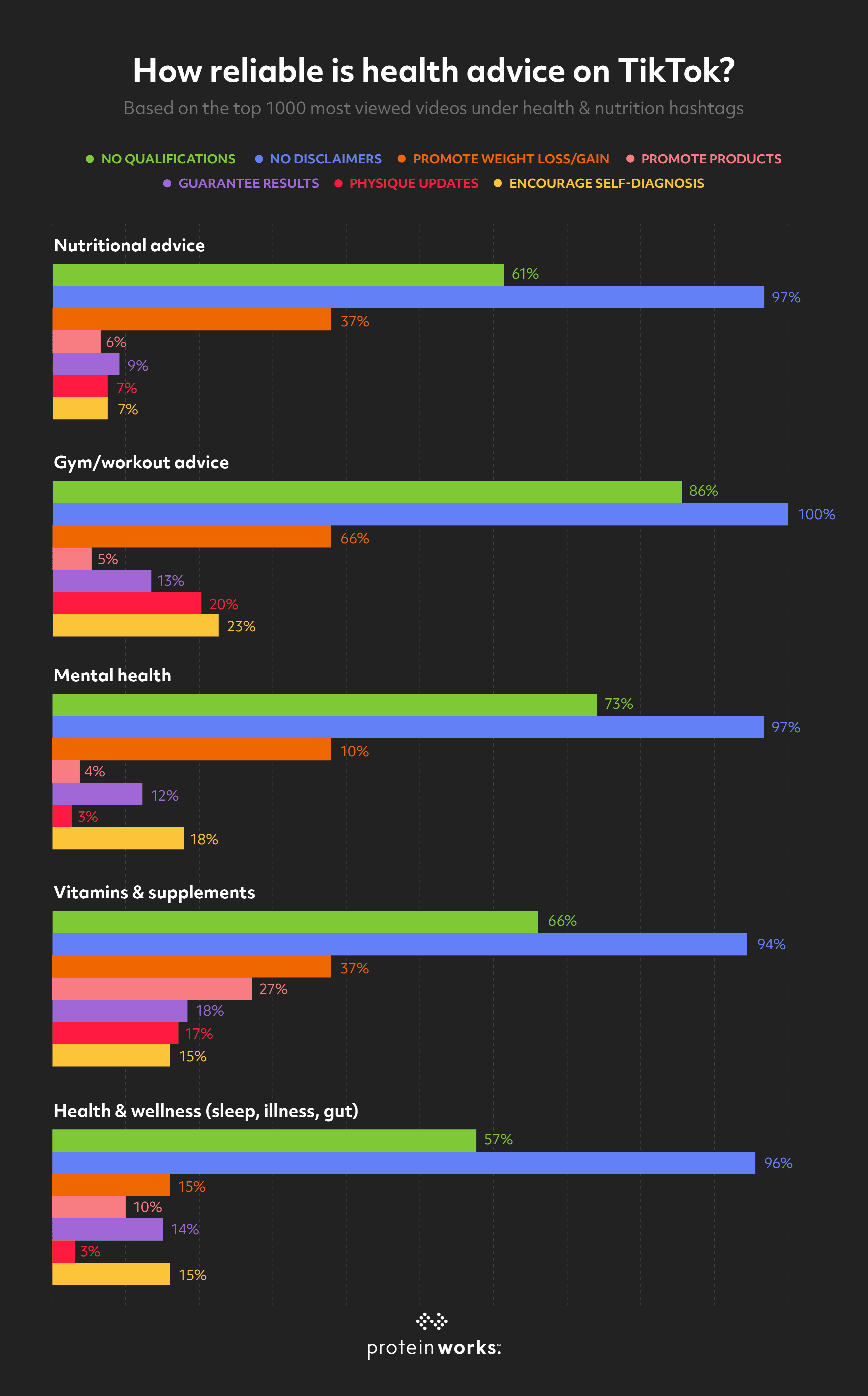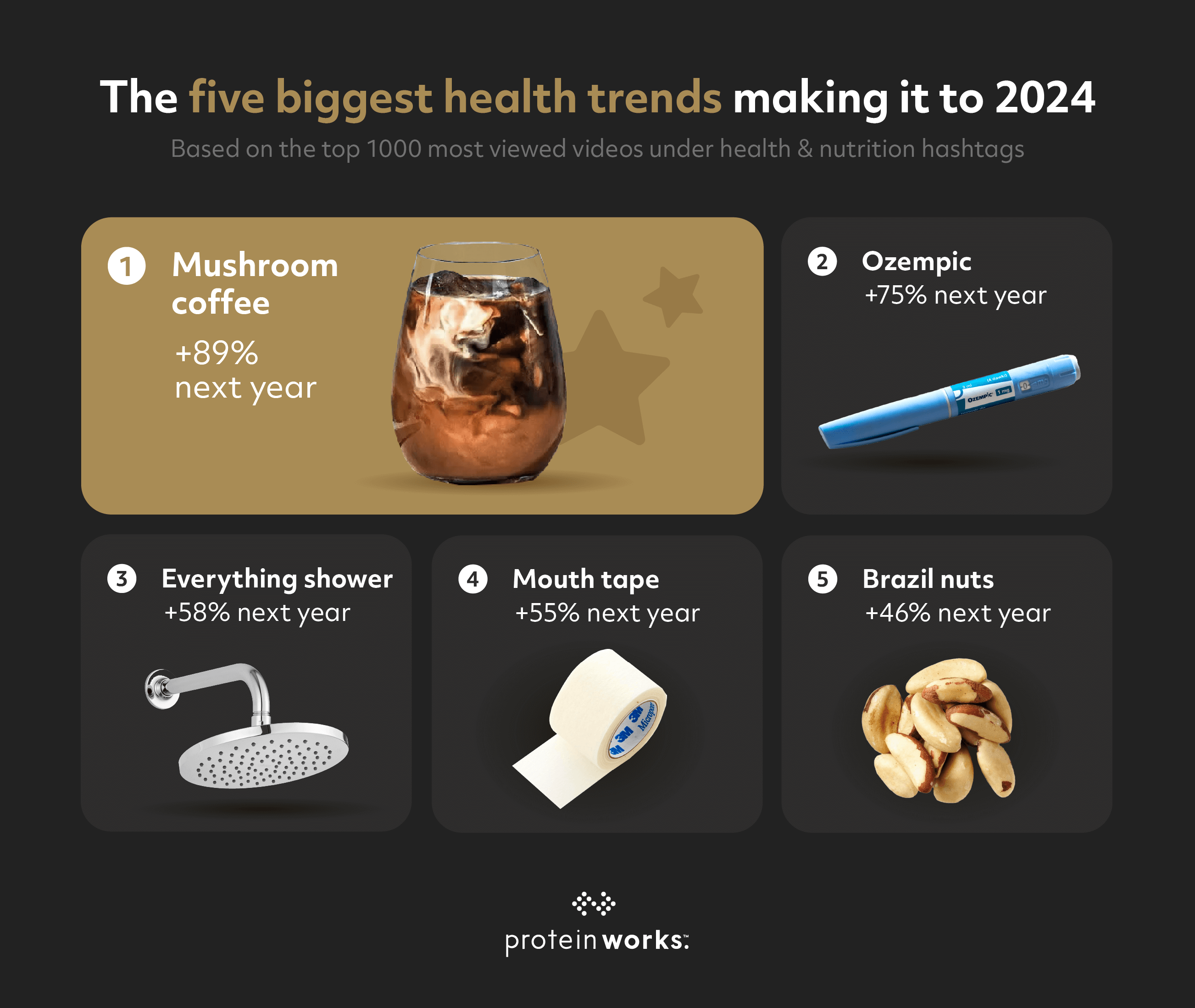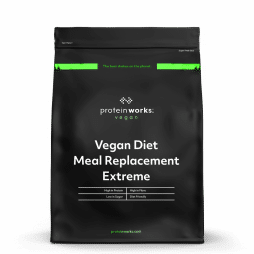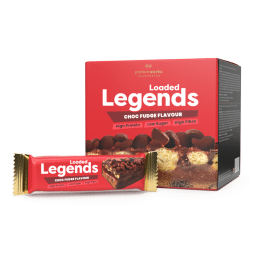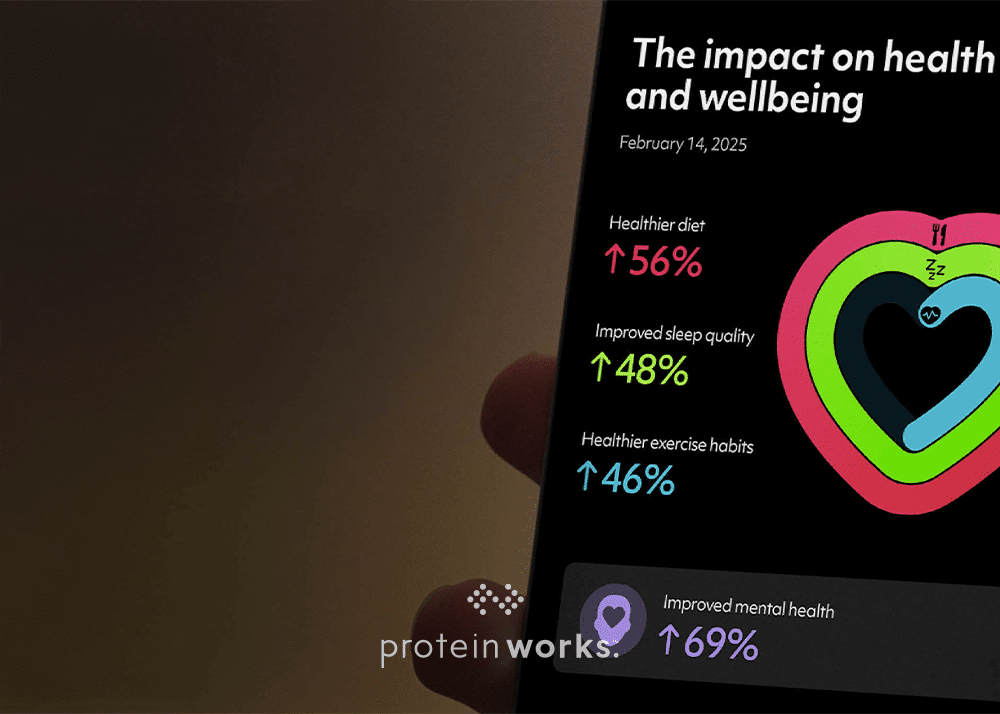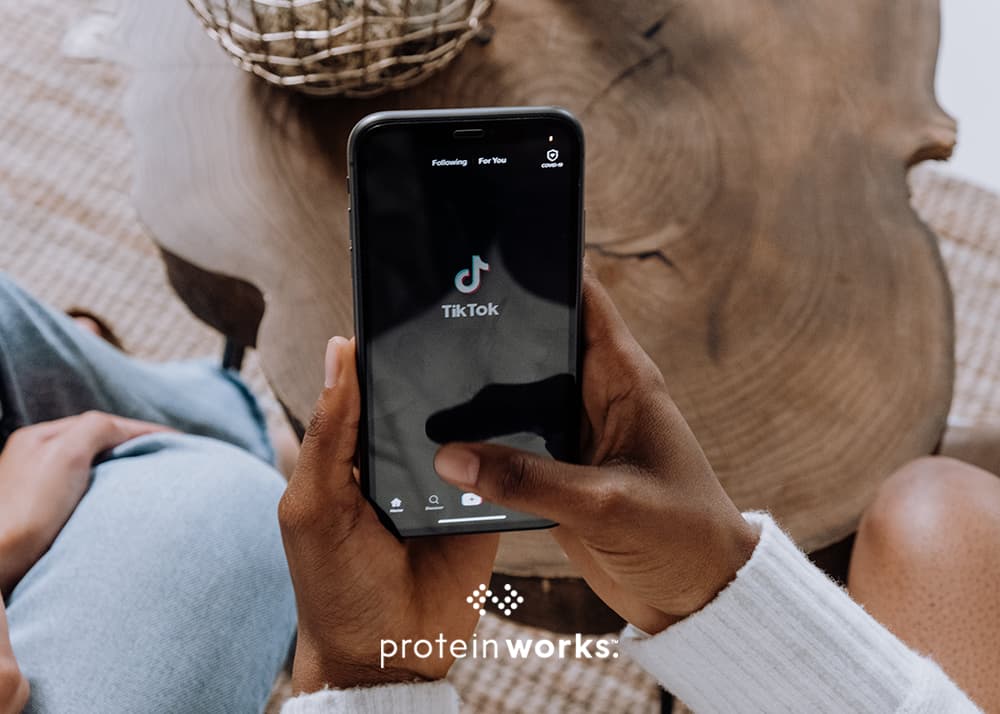
TikTok Health Misinformation: The Reality Behind Viral Wellness Trends
In recent years, TikTok has evolved beyond a platform for entertainment and creative expression and has become a one-stop destination for nutrition, health and wellness advice. Videos using #health have accumulated over 85.6 billion views alone, with others such as #nutritiontips amassing 3.7 billion. However, the more viral these tips become, the more challenging it is to determine whether the videos fuelling these trends are founded in fact or fiction.
To help people navigate the array of health information online, we at Protein Works have conducted a study looking at the validity of TikTok advice and how it fares regarding misinformation.
Our study analysed the top 1000 most viewed videos under nutrition and health hashtags and examined how they could be misleading. We focused on five different health sectors: nutrition, fitness, mental health, supplements & general health, and wellbeing. By highlighting common biases, we hope to bring awareness to misinformation around health online and empower people to question the content they consume.
As part of our study, we also looked into which were TikTok’s biggest health trends of 2023 and predicted which trends will continue to gain momentum going into 2024…
98% of videos under top health hashtags on TikTok are considered misleading
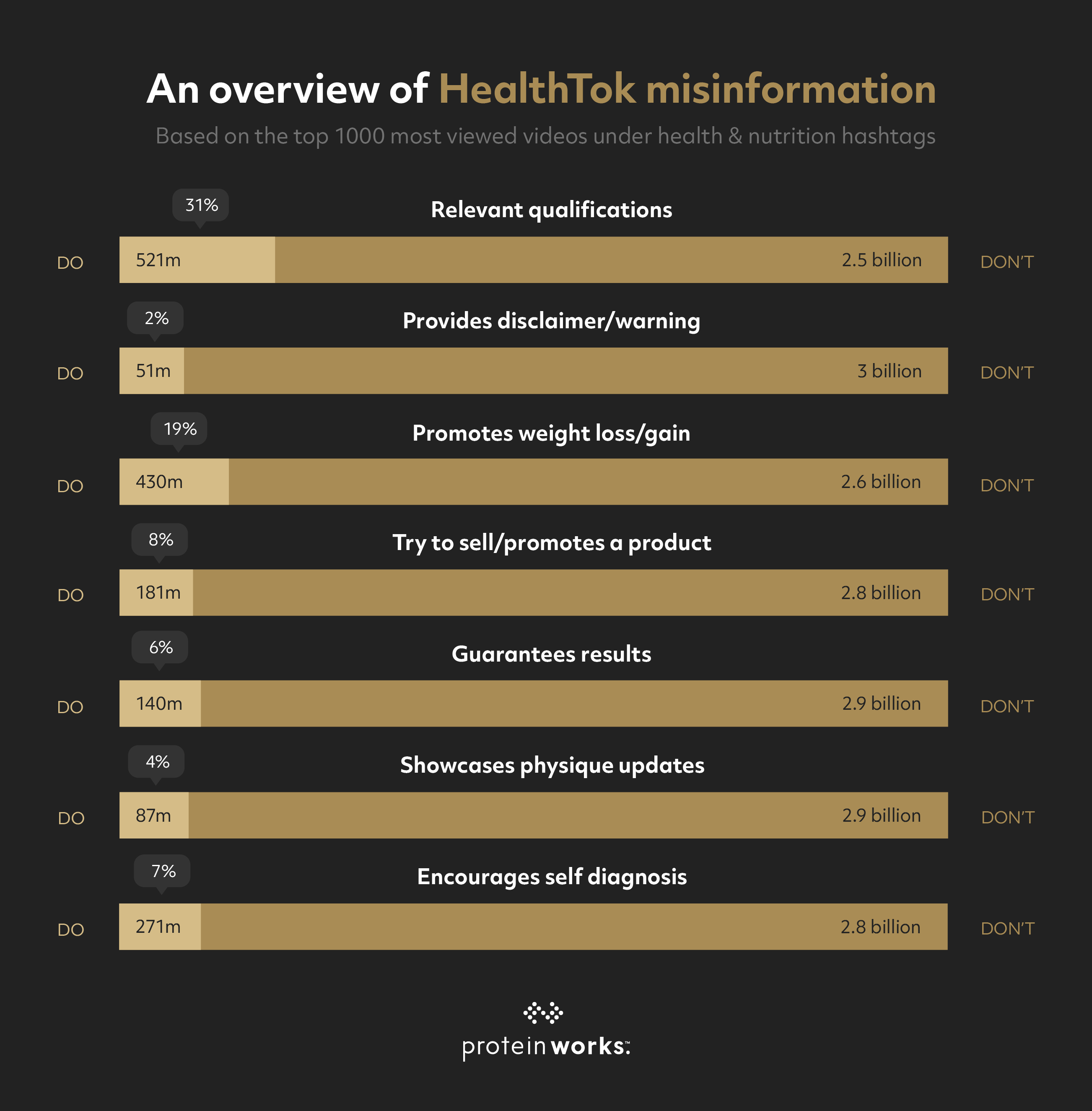
Critical thinking and individual research are imperative, too and users should not solely rely on social media content for health decisions. Equally, we believe it is important for content always to include disclaimers and warnings when providing advice on these topics, as what might work for one person might not work for another and could be considered misleading.
Our study revealed that only 2% of health videos regarding nutrition, mental health, fitness and supplement advice included disclaimers, while 7 in 10 (69%) health creators have no relevant qualifications; these could range from being a registered dietician or nutritionist to a qualified personal trainer or having a degree in sports science.
These qualifications help increase the validity of the information that is being conveyed and are something users should look for before trying any health advice seen online.
Unqualified creators have almost 5 times as many views than those with qualifications
While TikTok videos are an excellent place for health inspiration, users must remain mindful that not all viral trends are backed by scientific research, despite a large percentage of creators on their feed promoting them.
One of the most shocking findings from our study revealed that content from users with no qualifications gained almost five times more views than that from qualified individuals (500 million for qualified vs 2.5 billion without qualifications).
This makes it easy for the platform to become a breeding ground for misinformation. So, users are always encouraged to do their own research and consult a professional before implementing any advice into their daily lives.
The study also revealed that, while nutrition-related hashtags like #nutrition, #nutritiontips and #nutritiontok, had more qualified individuals than those under generic health hashtags, they were more likely to promote weight loss solutions (29%) and products (9%). Whereas health hashtags, such as #healthtok, #healthhacks, and #healthtrends were more prone to promoting self-diagnosis and guaranteeing ‘results’.
It is important to be aware that many videos promoting weight-loss solutions are effectively used to promote a product or service that content creators are either paid for or seeking to attract new customers for.
It is important to be aware that overexposure to particular content may skew users’ understanding of what “health” is. For instance, over a third (35%) of content under the #nutritiontips hashtag pushes weight loss as the primary goal.
Healthy nutrition is vital in maintaining balanced hormones, immunity, sleep and much more, which can easily get lost among weight loss content on these algorithms. Ensuring the benefits of nutrition are more broadly addressed allows users also to have a more well-rounded outlook on their health and well-being and is a healthier mindset to hold.
Only 3% of nutrition advice on TikTok provides warnings or disclaimers, despite nutrition needs being very individual-specific
The majority of videos analysed in the study consisted of nutritional advice on TikTok (41%). However, despite these videos having over 824 million views, the study found that 61% of the nutritional advice came from individuals lacking relevant qualifications, 37% centred around weight loss/gain, and only 3% contained any warnings or disclaimers.
This is particularly concerning as diets are highly individual and can be a sensitive topic for many. Registered dietitians (RDs) and nutritionists are the best sources of quality nutritional advice online to ensure the content users are consuming is backed by experts, this being said, only advice given specifically to users can be fully recommended.
An excellent example of where warnings and disclaimers would be crucial in nutritional content is the viral Brazil nuts trend. Brazil nuts have been soaring in popularity due to their high selenium content; however, too much selenium can be harmful.
Without disclosing the correct quantities, people could be causing themselves harm, making the content misleading and potentially dangerous.
Another example of this is the bone broth trend, which has gained popularity as a health remedy. While bone broth offers potential benefits [1], its promotion has raised concerns. Gwyneth Paltrow kicked off the trend, discussing how she pairs it with intermittent fasting, inadvertently contributing to disordered eating patterns which can be harmful for many.
Gym and workout videos primarily promote body image without regard to the physical and mental benefits
Like anything online, not everything should be taken at face value. Exposure to particular ideas may alter your perception of what fitness is. Overexposure to content that equates fitness to a lean physique or weight loss can be problematic, especially for younger audiences who may be unable to discern what is healthy from what isn’t.
The study revealed that two-thirds of gym and workout advice using health hashtags on TikTok promotes weight loss or weight gain, while one in every five videos provides physique updates. Exposure to this one-dimensional portrayal of fitness can contribute to unhealthy comparisons and unrealistic body – and fitness – expectations among viewers.
Our study concluded that it is essential to try and consume a wide array of fitness content that doesn’t just promote lean physiques or a narrow depiction of health. When looking for health or fitness content to follow, focus on accounts that emphasise the mental and well-being benefits that exercising or leading an active lifestyle must have as well.
Arguably, these benefits are more important and help people move away from the stigma that the gym’s primary goal is to improve one’s physique.
Our study also found that only 14% of the individuals offering gym and workout advice have relevant qualifications, such as personal training qualifications or a higher education degree in the area they claim to specialise in, marking it as the category with the lowest proportion of qualified advice.
Overall, while fitness videos may inspire your fitness journey, be sure to consult a qualified fitness professional before trying anything you’ve seen on TikTok, as they can tailor movements specific to your needs, body and goals.
Assess the impartiality of general health and well-being of content creators
When looking for quality advice online, general health and wellness videos focusing on topics such as sleep, illness, and gut health, emerged as the category with the most qualified creators, with 43% having relevant qualifications. However, while the content may be more reliable, it is important to note that 10% of videos attempt to promote products and were the second most likely to guarantee results (14%).
Likewise, vitamin and supplement content were the most likely to promote products (27%) and guarantee results (18%) in the whole study.
The boom of influencer marketing is a valuable tool for brands to get their products in front of consumers. Nevertheless, be sure to examine a content creator’s other content to gauge their genuine endorsement of promoted products.
Look for captions containing “AD” or sponsored tags within the content, and conduct your own research on a product by looking at the product’s website and consulting online reviews before making an online purchase.
15% of the general health and well-being videos also promote self-diagnosis. This can be particularly dangerous, as it might lead individuals to make health decisions without proper medical consultation, potentially leading to misdiagnosis.
Health & Wellness Wrapped: The Most Popular Health Trends In 2023
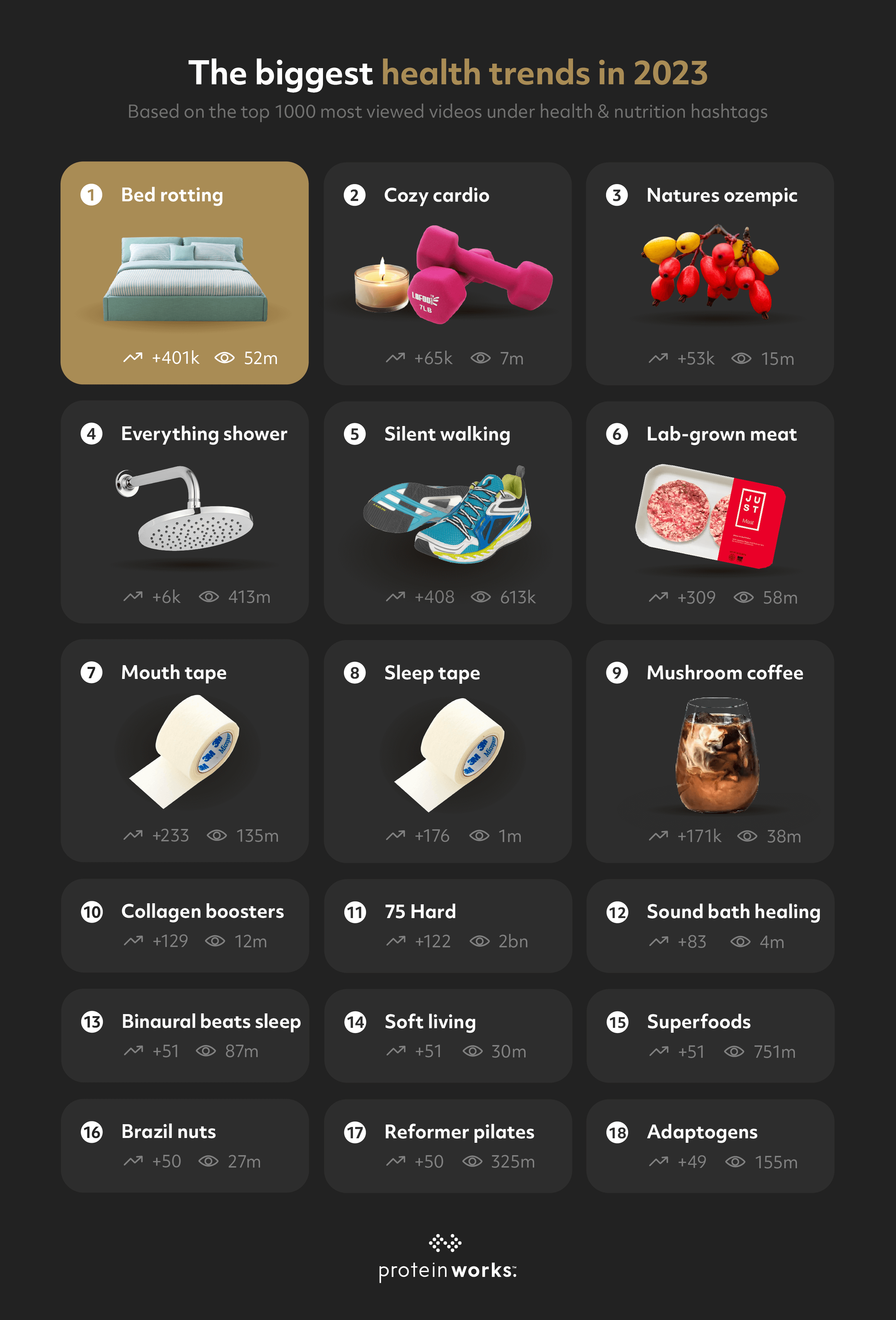
1# It’s official… bed rotting was the most prominent TikTok health trend for 2023! Worldwide TikTok searches increased by over +401,000% throughout the year, gaining over 52 million TikTok views and was made popular as a way to combat burnout.
While this may be the number one health trend for 2023, experts generally discourage extended bed rest without medical necessity as it can encourage fatigue, and isolation as well as interfering with regular sleeping patterns.
Also, while limited scientific studies focus specifically on “bed rotting,” numerous highlight the adverse effects of a sedentary lifestyle – leaving a distinct lack of support for this leading trend [2]. Maybe it’s one to leave in 2023.
2# Cosy cardio, which consists of low-intensity cardio exercises done in a comfortable, stress-free environment, saw TikTok searches increase by +65,000% in 2023. The trend has over 7 million views on TikTok and promotes physical activity without the pressure of high-intensity workouts.
While this trend is a great starting point for fitness, many health experts recommend incorporating low and high-intensity exercises into a workout routine to promote overall fitness in the long run. Switching up the intensity will be essential to feel the full benefits of working out [3]. However, this trend (in moderation) is a great way to encourage people to be more active while feeling comfortable.
3# This year, Nature’s Ozempic (or berberine) saw a search increase of +53,000% on TikTok and claims to provide natural benefits similar to the diabetes medication Ozempic, often used for weight loss [4].
Limited scientific studies [5] support claims that berberine can promote weight loss, and medical professionals warn against substituting prescribed medications with unverified natural alternatives. Despite the lack of evidence that nature’s Ozempic works as an alternative, views on TikTok videos using the hashtag have still gained over 15 million views.
4# Searches for the everything shower have increased by +6,000% across the year and incorporate multiple self-care routines into one extended shower time ritual. The trend, gaining over 413 million TikTok views, promotes self-care and mental relaxation. However, it has been advised against by dermatologists who warn long hot showers can negatively affect skin health [6].
5# Silent walking is a form of meditation and mindfulness that encourages mental clarity and stress reduction. TikTok searches for the trend have grown by 408% in 2023, making it into the top five health trends of the year. Unlike some health trends in the top five, this trend has the support of studies and mental health experts who state that it is a great way to help relieve stress and promote relaxation in your daily routine.
Data forecasts the emerging health trends for 2024
Using Google search volume forecasting, our research has helped predict some of the biggest health trends set to soar in 2024.
While some offer genuine benefits, others may pose hidden risks; always seek medical advice before participating in any health, nutrition or wellness trends.
2024’s leading health trend is all about boosting your brain!
1# Mushroom coffee is the next upcoming health trend, set to see a search increase of +89% going into 2024. This blend of regular coffee and medicinal mushrooms is believed to offer health benefits such as increased energy and improved focus. Scientific studies on mushroom coffee are limited, but research on medicinal mushrooms suggests potential wellness advantages like brain function and strengthened immunity.
A similar product that can also offer these brain-boosting benefits is nootropics, such as our Endless Nootropics. It wouldn’t be surprising if these may also see a spike due to people looking for alternative ways to increase their cognitive function in the new year.
2# Ozempic medication used initially for type 2 diabetes management continues to trend for weight loss going into 2024, growing 75%. While it has shown effectiveness in weight management, it’s crucial only to use it under medical supervision. Studies support its benefits for diabetes and weight loss, but most healthcare professionals may warn against the use unless specifically stated.
Another trend often associated with weight loss has been meal replacement shakes. Having already increased by 65% in the last month, these convenient shakes are a great way to enjoy a calorie-controlled meal and are likely to continue to increase in 2024 as people look for new and alternative ways to manage their weight.
3# The everything shower was a top 5 trend in 2023 and will continue going strong in 2024, with searches set to increase by 58%. While it can be seen as a time-saving approach, it raises concerns about water conservation and environmental impact. As well as causing potential damage to the skin, dryness, and irritation.
#4 Mouth Taping consists of using tape to keep the mouth closed during sleep, claiming to improve breathing and sleep quality. The trend was popular in 2023 but is set to have a resurgence in 2024. There are risks associated with mouth tape, especially for individuals with breathing issues, and it’s not widely supported by scientific evidence.
Sleep experts advocate for safer, evidence-based methods to improve sleep quality, like incorporating sleep supplements, such as Sleep Deep, into your nightly routine. As searches for L-Tryptophan have increased by 21% worldwide in the last month (an amino acid that can help with sleep apnoea and is often found in sleep supplements), it wouldn’t be surprising to see these also continue to be a rising trend in the new year.
#5 Brazil Nuts have been praised for their high selenium content, gaining popularity for their potential health benefits, including thyroid support and antioxidant properties. Predicted to grow again by 46% next year, Brazil nuts, despite being nutritious, can lead to selenium toxicity if over-consumed. Nutritionists and scientists recommend moderation when following this trend.
While not making the top five for 2024, adaptogens are another trend showing a promising increase of +19% in the new year. These herbs, roots and plant-like substances, such as ashwagandha, are great to consume to help alleviate stress and anxiety and promote overall well-being. These can be consumed as supplements, powders, soups, or drinks like our Endless Coffee or Super Greens Extreme.
The Take Home
In conclusion, it’s great to see that people are looking to put themselves first and find ways to make better choices for their health and well-being. A lot of social media health content includes short-term ‘viral’ trends and a lot of which may not be easily accessible or affordable to most people.
Notes & Methodology
*Our judgement of a ‘misleading video’ was that a disclaimer had to be featured in the video or the creator’s profile. This text should clarify to viewers that the information presented is solely the creator’s point of view and not expert guidance. The disclaimer would encourage users to conduct their investigation and get additional expert advice.
We analysed the top 1,000 most viewed videos under six health and nutrition-related hashtags. The hashtags included #healthhack, #healthhacks, #healthtok, #nutrition, #nutritiontips, and #nutritiontok.
The videos were judged on six factors:
- Qualifications of the Content Creator: Evaluating whether the individual sharing the advice has relevant credentials or expertise in the health and wellness domain.
- Presence of Disclaimers or Warnings: Checking if the content includes disclaimers, thereby indicating that the advice shared is subjective and not a one-size-fits-all solution.
- Promotion of Self-Diagnosis: Identifying if the content encourages viewers to diagnose their health issues without professional consultation.
- Product Promotion: Examining whether the video is geared towards promoting specific products or brands.
- Guaranteed Results Claims: Assessing if the content makes bold claims of guaranteed results, which can be misleading.
- Showcasing of Physique Updates: Observing if the content focuses on physical transformations, which could set unrealistic expectations for viewers.
Glimpse was used to predict Google search volume trends for 2024.
Sources
[1] https://www.ncbi.nlm.nih.gov/pmc/articles/PMC8618064/
[2]https://www.ncbi.nlm.nih.gov/pmc/articles/PMC7700832/
[3] https://www.ncbi.nlm.nih.gov/pmc/articles/PMC4993139/
[4] https://www.theproteinworks.com/thelockerroom/berberine-ozempic-alternative/
[5] https://pubmed.ncbi.nlm.nih.gov/32353823/
[6] https://www.ncbi.nlm.nih.gov/pmc/articles/PMC8778033/
[7] https://www.statista.com/statistics/1299771/tiktok-global-user-age-distribution/


